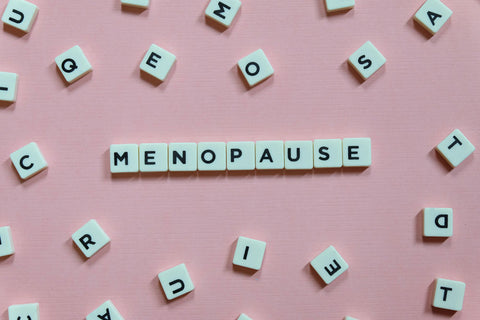The 3 Stages of Menopause: Perimenopause, Menopause and Post-menopause
One night, you go to bed with luscious hair, a thriving libido and regulated body temperature, and the next day, your hair’s thin, you’ve gained thirty kilograms, and things that used to be a slight inconvenience have now become a personal vendetta.
While some women seamlessly transition from regular periods to menopause, others can have a more challenging time.
Let’s dive straight into menopause and discuss the different stages, what symptoms you may feel, and what you can do about it.
Perimenopause
What is it? Perimenopause (1) is when changes to reproductive hormones start to occur, and cycles become more erratic.1 Perimenopause can last a few months to up to ten years! During this time, ovarian function starts to decline, which causes a drop in oestrogen and an increase in the follicle-stimulating hormone and luteinising hormone.1
What are the symptoms?
- Anxiety
- Brittle nails
- Changes in menstrual pattern
- Fatigue
- Hair loss
- Hot flashes and night sweats
- Increased gas and bloating
- Low libido
- Mood swings and shifts
- Skin issues
- Sleep disturbances
- Uterine bleeding problems
- Vaginal dryness
- Worsening PMS
Menopause

What is it? Once you’ve gone through a year without a menstrual bleed, you’re out of perimenopause and officially considered menopausal.2 Menopause (2) typically occurs in women between the ages of 45 and 55 and can last up to 14 years in some women.
The sharp decline in oestrogen associated with menopause can cause a range of symptoms, including:
- Anxiety
- Brain fog (3)
- Digestive problems
- Fatigue
- Headaches
- Heightened emotional sensitivity
- Hot flashes (4)
- Insomnia
- Loss of libido (5)
- Weight gain (6)
While we often pin the decline in oestrogen as the primary cause of these symptoms, they can also result from aging and mid-life stressors. 1
Post-menopause

What is it? Post-menopause (7) refers to the time from when menstruation has stopped for a year and beyond. Over time, many of the menopause-associated symptoms ease for most women, as the body adjusts to the lower levels of oestrogen (thank goodness!). For many women, peri-menopause is more difficult than post-menopause.
Unfortunately, due to lowered oestrogen levels, women have an increased risk of several health conditions, including osteoporosis (8) and cardiovascular disease.
How can you naturally support your body throughout all of the stages of menopause?

- A wholesome diet: To help manage menopausal symptoms, aim for a diet that’s rich in good-quality fruit and veggies, adequate proteins and a high intake of omega-3 fatty acids.3
- Look after your gut: We know that oestrogen production declines once we hit menopause, but the gut may be our saviour. The digestive system holds a collection of bacteria called oestrobolome that help metabolise and modulate oestrogen, even after menopause. So, make sure you’re tending to your gut health before, during and after menopause. I recommend consuming prebiotic-rich foods such as asparagus, onions and chicory root, and consider a probiotic.
- Consider therapy: Other life changes and stressors often accompany the menopausal transition. If you are struggling at this stage, you’re not alone, but it’s crucial to look after your mental health. Psychological intervention can bring new coping mechanisms and help manage menopausal symptoms, including hot flashes and mood changes.4
- Yoga: Menopause is the perfect time to stretch it out! Randomised control trials have indicated that yoga may be beneficial for insomnia and fatigue symptoms related to menopause.5
- Phytoestrogens: Dietary intake of phytoestrogens, including flaxseeds and red clover, may be a safe and effective way to reduce hot flashes in menopausal women.6 So, increase your intake of flaxseeds and take a look at consuming red clover under the guidance of a healthcare practitioner.
- Move your body: Exercise is an integral part of menopausal management, helping to minimise midlife weight gain, maintain bone mass, reduce stress, support cardiovascular health and decrease hot flashes.7 Menopausal women should aim to include a variety of aerobic, strength and balance exercises into their routines.
The Bottom Line
While everyone experiences menopause differently, implementing a nourishing diet, a balanced lifestyle, and supportive supplements can ease your transition into menopause and beyond.



